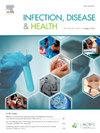耐多药细菌(MDR)医院获得性感染(HAI)和定植的预测:系统综述。
IF 2
Q2 PUBLIC, ENVIRONMENTAL & OCCUPATIONAL HEALTH
引用次数: 0
摘要
背景:医院获得性感染(HAI)是全球大多数国家的公共卫生重点。我们的主要目的是系统回顾有关重症监护病房(ICU)中耐多药革兰氏阴性菌的预测模型文献的质量:我们按照 PRISMA 声明的建议进行了系统性文献综述并进行了报告。我们根据 TRIPOD 核对表分析了文章的质量:初步检索发现了 1935 篇论文,最终有 15 篇文章被纳入综述。大多数分析研究使用了传统的预测模型(逻辑回归),只有三项研究开发了机器学习技术。我们注意到,在开发预测模型时,对TRIPOD核对表中建议的主要方法问题的遵守情况较差,如处理缺失数据(遵守率为20%)、模型建立程序(遵守率为20%)、评估模型性能(遵守率为47%)和报告性能指标(遵守率为33%):我们的综述发现,很少有研究使用有效的替代方法来预测重症监护病房中耐多药革兰氏阴性菌的感染情况。此外,我们还注意到缺乏处理缺失数据、特征选择和不平衡数据集的策略,而这是HAI研究中的一个常见问题。本文章由计算机程序翻译,如有差异,请以英文原文为准。
Prediction of multidrug-resistant bacteria (MDR) hospital-acquired infection (HAI) and colonisation: A systematic review
Background
Hospital-Acquired Infections (HAI) represent a public health priority in most countries worldwide. Our main objective was to systematically review the quality of the predictive modeling literature regarding multidrug-resistant gram-negative bacteria in Intensive Care Units (ICUs).
Methods
We conducted and reported a Systematic Literature Review according to the recommendations of the PRISMA statement. We analysed the quality of the articles in terms of adherence to the TRIPOD checklist.
Results
The initial search identified 1935 papers and 15 final articles were included in the review. Most studies analysed used traditional prediction models (logistic regression), and only three developed machine-learning techniques. We noted poor adherence to the main methodological issues recommended in the TRIPOD checklist to develop prediction models, such as handling missing data (20% adherence), model-building procedures (20% adherence), assessing model performance (47% adherence), and reporting performance measures (33% adherence).
Conclusions
Our review found few studies that use efficient alternatives to predict the acquisition of multidrug-resistant gram-negative bacteria in ICUs. Furthermore, we noted a lack of strategies for dealing with missing data, feature selection, and imbalanced datasets, a common problem in HAI studies.
求助全文
通过发布文献求助,成功后即可免费获取论文全文。
去求助
来源期刊

Infection Disease & Health
PUBLIC, ENVIRONMENTAL & OCCUPATIONAL HEALTH-
CiteScore
5.70
自引率
5.70%
发文量
40
审稿时长
20 days
期刊介绍:
The journal aims to be a platform for the publication and dissemination of knowledge in the area of infection and disease causing infection in humans. The journal is quarterly and publishes research, reviews, concise communications, commentary and other articles concerned with infection and disease affecting the health of an individual, organisation or population. The original and important articles in the journal investigate, report or discuss infection prevention and control; clinical, social, epidemiological or public health aspects of infectious disease; policy and planning for the control of infections; zoonoses; and vaccination related to disease in human health. Infection, Disease & Health provides a platform for the publication and dissemination of original knowledge at the nexus of the areas infection, Disease and health in a One Health context. One Health recognizes that the health of people is connected to the health of animals and the environment. One Health encourages and advances the collaborative efforts of multiple disciplines-working locally, nationally, and globally-to achieve the best health for people, animals, and our environment. This approach is fundamental because 6 out of every 10 infectious diseases in humans are zoonotic, or spread from animals. We would be expected to report or discuss infection prevention and control; clinical, social, epidemiological or public health aspects of infectious disease; policy and planning for the control of infections; zoonosis; and vaccination related to disease in human health. The Journal seeks to bring together knowledge from all specialties involved in infection research and clinical practice, and present the best work in this ever-changing field. The audience of the journal includes researchers, clinicians, health workers and public policy professionals concerned with infection, disease and health.
 求助内容:
求助内容: 应助结果提醒方式:
应助结果提醒方式:


